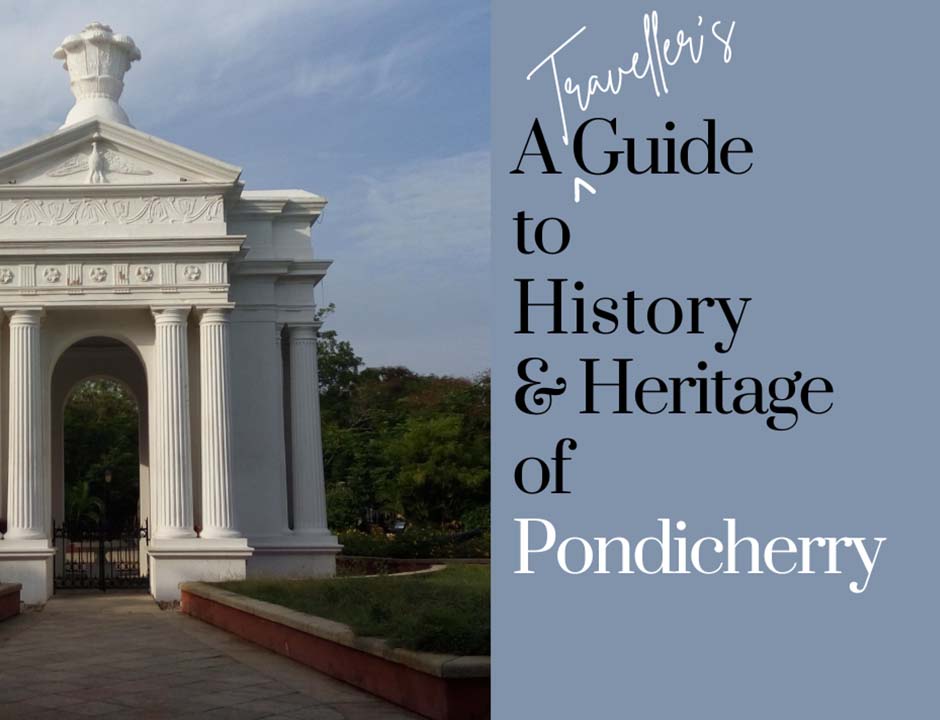A Cultural & Heritage Travel Guide for Pondicherry

Frequently Asked Questions by Travellers Visiting Pondicherry.
What is the early history of Pondicherry?
The first known history of Pondichery (Puthusserry) begins as early as the 2nd century. It was a stronghold of the Pallava dynasty. At the beginning of the colonial era, the Portuguese established a trading post and a factory here in 1523. Later, the Dutch and the British also set up their trading posts. In 1674, under the command of Francois Martin of the French East India Company established a settlement here and made Pondicherry the capital of French India. The French ruled Pondicherry until it was integrated into the Indian Union in 1954.
What is the colonial heritage of Pondicherry?
Pondicherry’s colonial heritage is visible in its architecture, culture, and cuisine. The French influence is particularly noticeable in the city’s French Quarter, also known as White Town. The architecture of the buildings here is a fusion of French, Tamil, and Indian designs. One can witness it in its elaborate balconies, pastel-coloured walls, and red-tiled roofs. The Governor’s Palace, the Romain Rolland Library, and the Pondicherry Museum are some notable colonial structures preserved well here.
What is the cultural importance of Pondicherry?
Pondicherry is known for its unique cultural blend of Tamil, French, and Indian cultures. A walk through the street of Pondicherry will reveal that to you within the first few minutes. The Aurobindo Ashram, founded by Sri Aurobindo and his spiritual collaborator, The Mother, is a major spiritual centre and a hub of cultural activities. Pondicherry is also known for its vibrant music scene, with Carnatic and Jazz being particularly popular.
How to reach Pondicherry?
Pondicherry is well-connected by air, rail, and road. The nearest airport is Chennai, which is around 135 km a/84 miles away. The city has a railway station, and several trains run to and from major cities in India. The city is also well-connected by road, with several state-owned and private buses running to and from Chennai, Bangalore, and other nearby towns.
What are the top historical and heritage places to see in Pondicherry?
a) Sri Aurobindo Ashram – Founded in 1926 by Sri Aurobindo and his spiritual collaborator, The Mother, the ashram is an important spiritual centre and a hub of cultural activities.
b) Pondicherry Museum – This is the best place to peep into the early days here in Pondicherry. The Museum also showcases items that are related to the local heritage and history as well.
c) Auroville – A unique experimental township that aims to create a universal community beyond nationality, politics, and religion.
d) French Quarter – Also known as White Town, the French Quarter is a charming area with colonial-style buildings and cobbled streets.
e) Basilica of the Sacred Heart of Jesus – A stunning Gothic-style church built in the 1900s.
f) Gandhi Statue – A statue of Mahatma Gandhi, the Father of the Nation, located on Promenade Beach.
g) Bharathi Park – A picturesque park with several statues, including one of the poets Subramanya Bharathi.
What are the other places of tourist interest in Pondicherry?
Pondicherry is a quaint port town. It has the famous Promenade Beach, Paradise Beach, Botanical Garden, Ousteri Lake, and Chunnambar Boat House. Unfortunately, all of them are a bit touristy. We suggest you explore the “Black Quarter” or “Tamil Quarter” of the town instead if you are interested only in heritage and history
Which is the best time to visit Pondicherry?
Like any south Indian destination, the period between October and March is the ideal time to visit Pondicherry. April-May is the peak summer months, and better to avoid travelling, especially if you are from a cold weather region. Monsoon season is also not advisable for exploring any cities in India.
What are the art forms to experience in Pondicherry?
Pondicherry has a rich cultural heritage of both French and Tamil, and several art forms thrive here. The city is known for its traditional music, including Carnatic music and Jazz. The Sri Aurobindo Ashram is the best place to enquire about ongoing or upcoming yoga or cultural events in Pondicherry. Visitors can also experience the unique form of textile printing called ‘block printing,’ which is widely practised in the city. Ask your guide if they can take you to one of the handmade tile-making units on the outskirts of the town.
What are the best souvenirs to buy from Pondicherry?
Pondicherry is known for its handicrafts, textiles, and aromatics. Visitors can buy handmade paper, block-printed fabrics, incense sticks, candles, and essential oils. The city is also famous for its leather products, including bags, wallets, and shoes. Since it is a tourist place prices can be a bit steep compared to other less touristy places.
What traditional food and drinks must you try while in Pondicherry?
Even if you are not a foodie, we advise you to sample the food diversity in Pondicherry. The entwined culture and cooking styles practised over the past few centuries have given birth to a few exclusive and delicious dishes here. We remember relishing on “Mutton Sambar” in a local eatery in Pondicherry. The city has a few French-style bakeries where one can try local and authentic versions of croissants, baguettes, and other pastries. You can also sample the local wines. Unfortunately, we did find them appealing to our taste buds.
How many days are required to explore Pondicherry?
Pondicherry is a small city, and visitors can explore most of its major attractions in two to three days.
Is visiting Pondicherry worth it?
Yes, Pondicherry is worth visiting, especially for travellers interested in history, culture, and spirituality.
What are the best historical and heritage or local experience hotels available in Pondicherry?
Pondicherry has several historical and heritage hotels that offer guests authentic local experiences. We have selected the best for you to consider. Please check our list below;